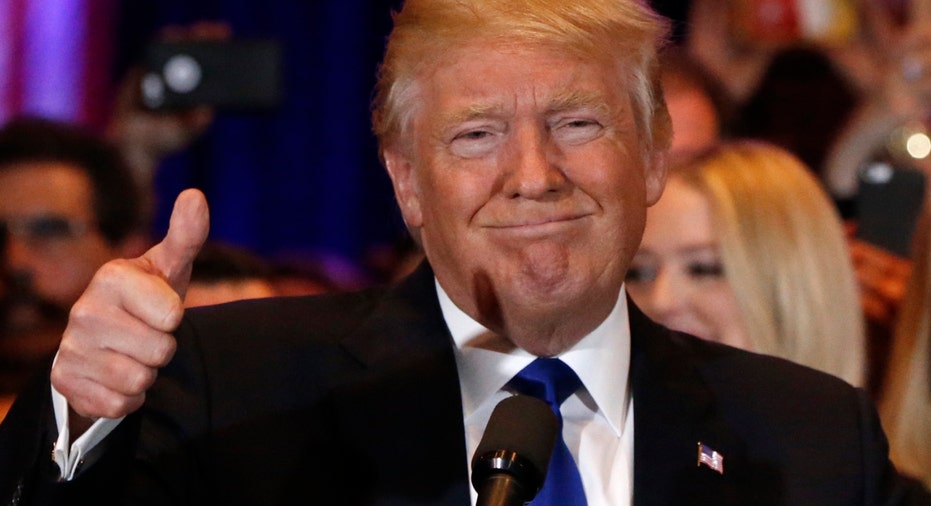Why Trump and Silicon Valley Need Each Other

The Trump campaign has opened an office in Silicon Valley. The question is why?
Donald Trump’s pointed rhetoric on immigration, manufacturing, diversity and other charged issues have not exactly been tech friendly. It’s not surprising that there’s no love lost between the presumptive GOP presidential nominee and Bay Area elites.
The Donald has gone after Apple’s Tim Cook for not helping the FBI crack an iPhone, Facebook CEO Mark Zuckerberg over pushing for more H-1B visas for foreign tech workers, and Jeff Bezos for using his ownership of the Washington Post to keep politicians off Amazon’s back on tax and antitrust issues.
The feeling is clearly mutual. If Silicon Valley leaned any further left, it would fall into the Pacific Ocean. But the prospect of a Trump presidency, in particular, seems to rub even right leaning business leaders the wrong way.
Traditional GOP supporters like venture capitalist Marc Andreessen and HP Enterprise CEO Meg Whitman have come out strongly against Trump. And last week, when word got out that Intel CEO Brian Krzanich would be holding a Trump fund-raiser at his home, the event was abruptly cancelled.
Maybe the question we should be asking is, does it even matter? The last time the Golden State voted Republican for president was George H. W. Bush in 1988. For six elections, California’s been a solid blue state. And while Mitt Romney reportedly raised $8 million from the tech sector in 2012, that’s a drop in the bucket for the real estate mogul and a campaign that will require at least $1 billion.
But there’s more here than meets the eye. There are some very big reasons why Trump and Silicon Valley need to court each other, as odd a couple as they would make.
The vast majority of tech elites may bleed blue, and the ones that don’t may despise Trump’s politically incorrect speech, but if Republicans win the White House and maintain control of Congress, it will be a little late to start lobbying for tax, immigration, antitrust, privacy, intellectual property and a host of other policy issues near and dear to the hearts of tech execs.
I’m not saying that Trump would necessarily aim in their direction, but as powerful as technology companies are, they don’t need any more enemies in Washington than they already have. And it’s not at all clear that a Clinton administration would be more favorable to their efforts. They may have fond memories of Bill Clinton and the dot-com boom, but Hillary is her own person.
As Andreessen famously wrote, “Software is eating the world,” meaning tech innovation is disrupting every major industry on Earth. Meanwhile, the Federal Government has been pushing ever more onerous legislation, rules and regulations on business. Those two opposing forces are clashing on more and more fronts than ever before. It’s not in Silicon Valley’s best interest to shoot itself in the foot when it comes to Trump.
Now let’s talk about the man that nobody thought could get this far. He may be climbing in the polls, but he’s still the underdog and Hillary will be a formidable opponent. Even if Trump begins to act more presidential for the general election, the airwaves and Internet will be blanketed with Clinton ads to remind voters of his inflammatory rhetoric during the nomination cycle. The months leading up to November 8th will lend new meaning to the tactic of using a candidates own words against him.
In other words, Trump will need all the help he can get. And there’s a very good reason why technology names sit atop all the most powerful brands lists. From Apple and Google to Uber and Airbnb, tech companies are among the most recognized brands and their leaders are among the most influential opinion leaders on Earth. Their reach is not limited to Silicon Valley. Their reach has no limits.
Trump may be a populist candidate, but every voter uses Apple, Google and Microsoft technology every day of their lives. I can think of no wildcard more capable of sealing Trump’s fate than for Clinton to have the most powerful leaders of the most recognized brands in tech in her camp, alongside the usual notables from the entertainment world.
Everyone talks about demographics, but I just can’t see how a Republican candidate can win without big business on his side, and many of the biggest names in business are in tech. Its influence reaches every potential voter. Trump needs Silicon Valley. And, in the event that he wins, with or without their help, Silicon Valley will need Trump.



















